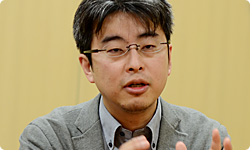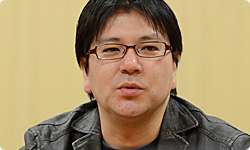2. ''I've Seen Ghosts!''
Now, we’re obviously all here today to discuss Project Zero 2: Wii Edition, but before we go any further, there is something I’m dying to ask.
Okay.
I just wanted to ask how you approach the development process, and how you actually spend your days normally, as the creators of a long-running horror game series.
(laughter)
Do you spend all day watching horror movies and looking for new ways to scare people? And are you constantly analysing why certain things are frightening, and how they might work within the context of a video game? I’ve just got this strange fascination with finding out more.
Well, each of us has our own approach, I would say. Shibata-san and I are very different. I actually don’t particularly like scary things.
What do you mean, you don’t like scary things? You’ve been making horror games for a decade!
Well, don’t get me wrong. I do sometimes get the urge to see something scary, go to a fairground haunted house or see a horror film, and end up thinking, ‘Ahhh! This is terrifying!’ I enjoy them, but am still scared out of my wits.
So you aren’t the type of person who’d usually go out of their way to be frightened.
I’d say that’s true. Or at least, that was what I was like about ten years ago, when I began working on the Project Zero series. From that point on, the way I saw things really changed.
In what way did it change?
When I found something frightening, I’d then ask myself why it had been frightening. I would analyse it quite calmly afterwards. I’d watch the same scene over and over again on a video and think, ”The way this is cut is really effective.” I think that subconsciously, I was always thinking about how things might be used in the game.

So the person who had tended to avoid frightening things became someone who liked to analyse why things were frightening.
That’s right. But there is still that instinctive aversion to the unknown and unexplained, so things would still frighten me. I remember when I wanted to experience a haunted house as research for this game, and invited Osawa-san and Izuno-san to come with me...
Ah, they aren’t the kind of guys to be frightened by anything! (laughs)
Indeed they’re not! Going to a haunted house at a theme park together with them meant that we spent the whole time nosing around, seeing how it was put together. We must have been the most annoying visitors they ever had!
Ha, you sound like a real nightmare! (laughs)
Of the three of us, I was the one who would be relatively shocked by things in the haunted house. While I might look at frightening things from an analytical perspective, they do still have an impact on me the first time I experience them. So I was feeling the fear.
There are actually a surprising number of people who claim they don’t like scary things, but still like to experience them. So you might be screaming your head off, but at the same time, it’s fun. It’s really curious how people will say one thing, and then go and do the exact opposite.
I think that’s basically exactly what I’m like! (laughs) My role during development is to act as a kind of guinea pig. I’ll put on headphones and play the game late at night. When something scary happens, I’ll recoil in my seat, and that will mean that it’s worked.
Right. Well, when people are shocked or scared, they recoil. It’s an instinctive reaction, isn’t it?
Yes, and it’s something we all share, no matter where we’re from. I was once with someone from America who was playing the game, and it was just like a cartoon. They really did jump out of their seat!
That kind of reaction only occurs when someone is really surprised.
They laughed about it afterwards, saying things like, “You really got me that time!” (laughs) I realised that no matter where you come from, and no matter what language you speak, the reaction to frightening things, and the sense of relief you get when they’re over, is exactly the same.
It’s interesting that we laugh after being frightened or surprised by something. It’s a curious feeling.
Yes, it really is. I think that emotionally, fear and laughter are actually closely related. They’re both reflexes and I think they share certain aspects, emotionally.
Now, Shibata-san, would you say you’re someone who goes out of his way to be frightened?
Yes, I am. I watch plenty of horror films, and I’m really particular about horror being done properly, so to speak.
So according to your sense of how horror should be done, what do you consider the most important element to be?
Well, it’s something that Kikuchi-san talked about when he discussed Spirit Camera: The Cursed Memoir. He spoke about getting the player’s imagination working. No matter what developments there might be in terms of direction or graphics, the most frightening thing is always what’s in your head. That’s why there are times when the film of a book won’t be as scary as the original story.

If you get to see something clearly, it can often end up reducing the effect.
You can actually get a curious feeling of relief, “Ah, there it is at last!” (laughs)
That’s right! (laughs)
The most frightening thing is when you aren’t sure what’s out there. When you know the true nature of something, the kind of fear you feel is different.
It’s the way that Alien6 is a much more frightening film before the alien actually appears. 6 Alien: An American science fiction film that was released in 1979. It tells the story of the encounter between humans on a space voyage and an alien life form.
Yes, precisely. I feel that the kind of fear that appeals to the imagination is more profound, and stays with you for longer. It was the desire to successfully create this kind of fear in a video game that led to the development of the Project Zero series. And, well, there is another thing... I’ve seen ghosts.
...What!? You’ve really seen ghosts?
That’s right. And I think that after that, I wanted to be able to recreate that experience in a game. I’m talking about things like the feeling before the ghost appears, and the strange sounds you hear when you see them. I wanted people who’d actually seen ghosts to play the game and say, “Yes, that’s it! That’s what it’s like!”
So actually having experiences like that led to you becoming deeply involved in the world of horror.
I used to see quite a lot of ghosts when I was a kid. That’s why I couldn’t bring myself to watch horror films - they were just too frightening. Then after I’d stopped seeing ghosts, I started watching horror films, and they made me feel curiously nostalgic.
Really? So you didn’t feel afraid, you felt nostalgic?
“Ah, that reminds me of the way it felt!” (laughs) I mean, I found these experiences very frightening when I was a child, but now I have the ability to also enjoy a horror film as a work of art. I’ve developed horror games with the desire to utilise my experiences.
